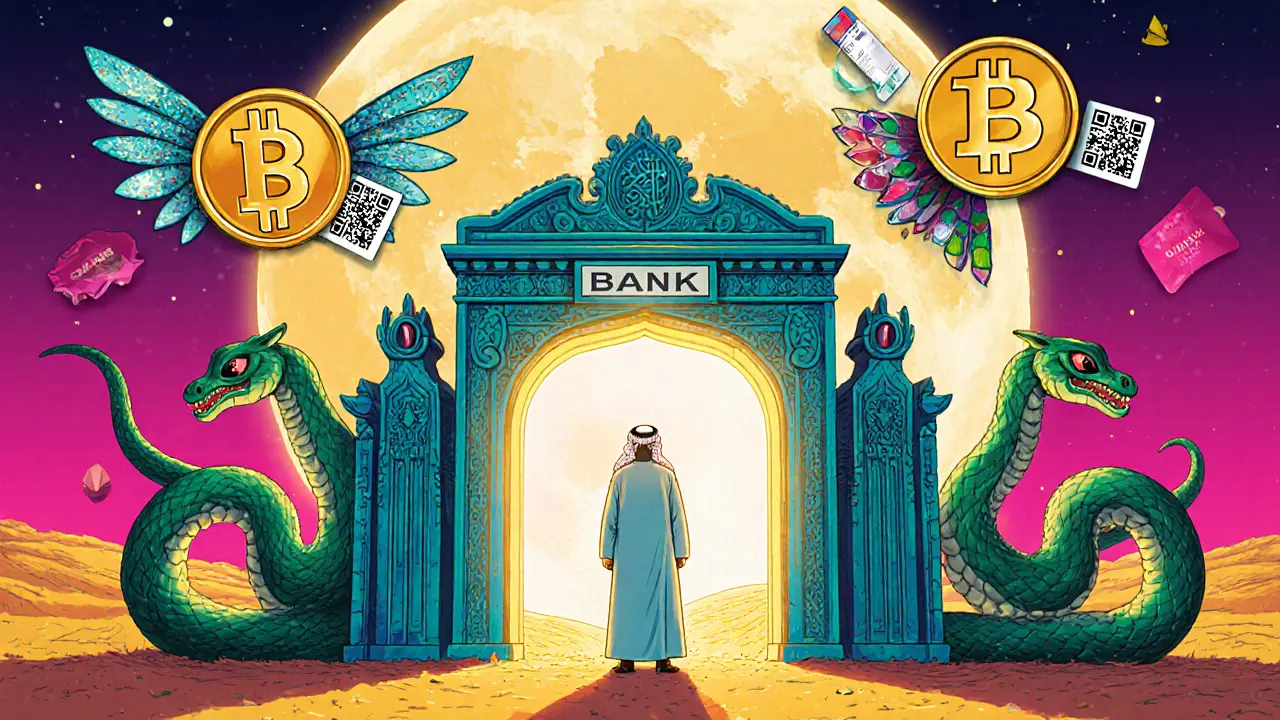Saudi Crypto Conversion Cost Calculator
Conversion Calculator
Despite having one of the fastest-growing crypto markets in the Middle East, Saudi Arabia has one of the strictest banking bans on cryptocurrency transactions in the world. You can buy Bitcoin, trade Ethereum, or hold Solana in your wallet - but you can’t link any of that to your bank account. Not legally. Not directly. Not through any Saudi bank.
This isn’t a case of unclear rules. It’s a deliberate wall. Since 2018, the Saudi Central Bank (SAMA) has barred all licensed financial institutions from handling cryptocurrency transactions. That means no deposits, no withdrawals, no wire transfers, no crypto-to-riyal conversions through banks. If you’re a Saudi resident trying to buy crypto, you’re forced to use peer-to-peer platforms, international exchanges, or third-party payment processors - all outside the official financial system.
Why? The government’s official stance is simple: cryptocurrencies are not legal tender. They’re not regulated. They’re not supervised. And they pose serious risks - money laundering, fraud, market manipulation, and financial instability. In 2019, the Ministry of Finance doubled down, warning citizens that any losses from crypto investments won’t be protected by law. No refunds. No recourse. No safety net.
But here’s the twist: Saudi Arabia’s crypto market is booming. In 2024, the value of crypto assets held by Saudis hit $23.1 billion. Transaction volumes jumped 153% in just one year, crossing $31 billion. Around 4 million Saudis - over 11% of the population - own some form of cryptocurrency. And that number is expected to grow. By 2025, the market is projected to generate nearly $500 million in revenue. So how is this possible if banks won’t touch it?
The answer lies in the shadows of the system. Saudis are using international exchanges like Binance, Kraken, and Bybit. They’re trading via peer-to-peer platforms like Paxful and LocalBitcoins, where buyers and sellers meet directly using cash deposits, gift cards, or even mobile money. Some use crypto-friendly banks in the UAE or Europe to move funds. Others rely on trusted intermediaries who accept cash in Riyadh and send crypto from abroad. It’s messy. It’s risky. But it works.
Businesses face even bigger hurdles. A crypto startup in Riyadh can’t open a business bank account. It can’t pay employees in fiat. It can’t receive payments from local clients through standard channels. Many are forced to register offshore, hire foreign staff, and route all transactions through Dubai or Singapore. Some even set up shell companies abroad just to access banking services. The cost? Higher fees, slower payments, and constant legal uncertainty.
And then there’s the tax problem. Crypto is treated as an asset, not currency. That means if you sell Bitcoin for a profit, you don’t pay capital gains tax as an individual - good news. But if you run a crypto business, you owe 20% corporate income tax, 15% capital gains tax, and 2.5% zakat. The catch? You can’t pay these taxes through your bank because your bank won’t accept crypto-related transactions. So how do you pay? You use cash. You use third-party agents. You use foreign accounts. It’s a bureaucratic nightmare.
Meanwhile, the government is quietly building its own digital currency. Saudi Arabia is part of the mBridge project - a multi-country central bank digital currency (CBDC) pilot with China, the UAE, Thailand, and Hong Kong. SAMA is testing blockchain-based settlement systems for interbank transactions. They’re not banning blockchain. They’re not banning digital money. They’re just banning decentralized, uncontrolled crypto.
This creates a strange duality. On one hand, religious leaders have issued fatwas saying Bitcoin and other cryptocurrencies are Sharia-compliant. That’s a big deal in a country where religious approval carries weight. On the other hand, the central bank refuses to let banks touch crypto. One side says it’s morally okay. The other says it’s financially dangerous.
There’s also the legal gray zone. Saudi Arabia’s Anti-Money Laundering Law (AML) and Counter-Terrorism Financing Law (CFT) don’t mention crypto by name. But they define "funds" broadly - including any asset transferred electronically. That means crypto transactions could still fall under AML/CFT rules. Authorities can freeze accounts, investigate users, and prosecute if they suspect illegal activity. But without clear crypto regulations, enforcement is inconsistent. You could be fined. You could be ignored. It depends on who’s looking.
The real pressure for change is coming from the people. Over 60% of Saudi Arabia’s population is under 30. They’re tech-savvy, globally connected, and open to new financial tools. They see crypto not as a gamble, but as a way to save, invest, and bypass a rigid, state-controlled banking system. They’re not waiting for permission. They’re already doing it.
Compare Saudi Arabia to the UAE or Bahrain. Both have clear licensing systems for crypto exchanges, regulated custody services, and direct bank integration. Saudi Arabia? No licenses. No clear rules. Just a ban.
So what’s next? No one expects a full reversal of the banking ban anytime soon. But the signs are there. The mBridge project shows the government wants digital money - just not decentralized. The market growth shows demand won’t disappear. The religious endorsement shows cultural acceptance is growing. The youth population shows change is inevitable.
For now, the ban remains. It’s a wall. But it’s a wall with cracks. People are climbing over it. Businesses are building bridges around it. And the government? It’s watching. Testing. Waiting. Maybe for the right moment to step in - not to stop crypto, but to control it.
If you’re in Saudi Arabia and want to trade crypto, here’s what you need to know:
- You can own crypto. No law says you can’t.
- You can’t use your Saudi bank account to buy or sell it.
- You must use international exchanges or peer-to-peer platforms.
- You’ll need to find alternative ways to deposit and withdraw Saudi Riyals - cash, gift cards, or third-party services.
- If you’re a business, prepare for offshore structures, foreign banking, and complex tax reporting.
- Keep records. Even without taxes, you could be audited under AML laws.
There’s no official path. But there are workarounds. And as long as demand keeps rising, those workarounds will keep evolving.












13 Comments
so banks cant touch crypto but people still buy it? lol guess the gov is just waving a stick at windmills
It's not that the government is against digital assets-it's against decentralization. The mBridge project proves they're investing heavily in state-controlled blockchain infrastructure. The ban isn't anti-technology; it's anti-disruption. They want the benefits of digital finance without relinquishing control. Classic central bank behavior.
There’s something profoundly human about this tension-people reaching for freedom through technology while institutions cling to control. The Saudis aren’t rejecting crypto because it’s evil; they’re terrified of losing the leash. But you can’t un-invent curiosity. When 11% of a nation’s population is already in, you’re not fighting a trend-you’re fighting gravity. The wall will hold, but the climbers? They’re already on the other side, building gardens where the sun breaks through.
It’s so sad how people are forced into these risky workarounds just to participate in something that’s clearly the future. I hope someone finds a way to make this safer for regular folks. You shouldn’t need a smuggler’s mindset to invest in your own financial future.
Wait-so if crypto is an asset and not currency, why can’t you just declare it like stocks? Is the tax system really that outdated? Also, how do they even track it without bank data? This feels like trying to regulate air.
Of course the Saudis are banning crypto-because they're still operating under 19th-century financial paradigms while the rest of the world is already in the 22nd century. The fact that they're building a CBDC but outlawing Bitcoin is the most ironic thing since the Vatican selling indulgences. They don't fear blockchain-they fear irrelevance. And the youth? They're already writing the next chapter. The regime is just scribbling in the margins with a red pen.
The regulatory incoherence is not merely inefficient-it is ontologically untenable. One cannot simultaneously acknowledge the legitimacy of blockchain infrastructure through multilateral CBDC initiatives while criminalizing decentralized asset ownership under an expansive AML/CFT framework that lacks statutory specificity. This is not policy-it is performative governance, designed to project authority while evading accountability. The citizenry, in their pragmatic subversion, are not breaking the law-they are exposing its epistemological fragility.
Brooo the Saudis are out here using crypto like it’s a secret club and the bank is the bouncer 😭💸 I’ve seen guys in Riyadh buying BTC with gift cards from the mall… like wtf is this, a heist movie? 🤯😂 The gov is scared of their own people being smart. Meanwhile, I’m over here in Delhi laughing and buying Dogecoin with UPI 😎
lol people think crypto is freedom? nah its just a trap. the feds and the mideast gov’s are watching every tx. they just let you use it so they can track you better. also zakat on crypto? that’s just islamic tax laundering. they want your money but not your power. and the youth? they’re just being manipulated by influencers. #wakeupppl
As an Indian who’s watched crypto grow here too-this feels familiar. We had the same ban in 2018. Banks blocked everything. People used cash transfers, hawala networks, even WhatsApp groups to trade. Now? We have regulated exchanges. The key isn’t to ban-it’s to evolve. Saudi’s youth aren’t rebels. They’re just early adopters who saw a gap and walked through it. Respect.
Let me be perfectly clear: this is not a banking ban. It is a calculated, orchestrated operation by global financial elites-backed by the IMF and the Bank for International Settlements-to funnel all digital currency into state-controlled CBDCs. The mBridge project is the Trojan horse. The ‘crypto ban’ is the distraction. Your ‘peer-to-peer’ trades? Monitored. Your ‘cash deposits’? Traced. Your ‘offshore shell companies’? Already flagged. They are not afraid of Bitcoin. They are afraid of you realizing you’ve already lost.
Y’all are making this sound so complicated. Look-I’m a 27-year-old mom in Texas, and I bought my first ETH through a P2P app using a Walmart gift card. If I can do it, so can Saudi women. It’s not about legality. It’s about access. And these people? They’re not breaking rules-they’re rewriting them. Keep going. We’re rooting for you.
The institutional contradiction here is a textbook case of path dependency meets disruptive innovation. The SAMA mandate is a regulatory artifact of legacy infrastructure-designed for a fiat monoculture. Meanwhile, the market has already achieved Pareto efficiency in decentralized on-ramps: liquidity is distributed, trust is peer-to-peer, and arbitrage is localized. The CBDC isn’t the future-it’s the last gasp of centralized monetary sovereignty. The real question isn’t whether the ban will fall-it’s whether the state will co-opt the infrastructure or be rendered obsolete by it.